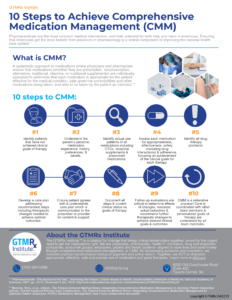
By Katherine H. Capps, Co-Founder and Executive Director, GTMRx Institute; President, Health2 Resources
September 9, 2020
CMM: Accept no substitutes
You wouldn’t refer to all cars as Lamborghinis, nor would you refer to all vegetables as broccoli. Words matter. Specificity matters.
As we try to advance comprehensive medication management, it’s important to use words with precision—including comprehensive medication management.
To understand and measure comprehensive medication management (CMM), we need a common language that describes and defines it. Success requires a defined CMM process that holds provider organizations accountable for patient outcomes. And we have that.
CMM is a comprehensive patient care process, with a set of essential functions and operational definitions that explicitly outline the steps required to deliver the intervention consistently. CMM has 10 essential components. An organization must do all 10 or they are not providing comprehensive medication management.
CMM’s intervention is that service—all 10 elements—not a single encounter. Simply put, it is
The standard of care that ensures each patient’s medications (whether they are prescription, nonprescription, alternative, traditional, vitamins, or nutritional supplements) are individually assessed to determine that each medication is appropriate for the patient, effective for the medical condition, safe given the comorbidities and other medications being taken, and able to be taken by the patient as intended.[1]
There’s little ambiguity there.
When you call CMM by another name, you dilute its significance. It becomes difficult to discuss CMM’s unique value. And if we are to make the business case for CMM, we need to be as unambiguous as possible.
Fighting imprecision and ambiguity
If CMM is unambiguous, why is there confusion?
Let’s start with the obvious: CMM continues to be conflated with medication therapy management (MTM). We frequently hear the terms used interchangeably.
They are not interchangeable.
MTM encompasses all types of medication management. CMS adopted the term “medication therapy management” and included it in the 2003 Medicare Part D legislation.[2] The term—or versions of it—has been used loosely and has taken on many different definitions and meanings over the years.
It’s often unclear exactly what the intervention is and what steps are taken to care for the patient.
CMM, in contrast, requires follow-up to confirm that changes were made and that they produced the intended outcome—medication optimization.
Outcomes-based service
How can you measure success if there’s no standard definition? You can’t—and yes, it’s been tried.
A 2014 systematic review by AHRQ looked at 44 studies that all were labeled as “medication management services.” The evaluation produced no identifiable outcome. It didn’t necessarily show there wasn’t an outcome. Instead, the authors reported there wasn’t enough clarity around what the intervention actually was.
“Whether they used the term ‘pharmaceutical care’ or ‘MTM,’ studies did not describe intervention components and features in a consistent manner or in sufficient detail.” As a result, they couldn’t determine from the study what the intervention was, so they couldn’t identify an outcome.[3]
Fidelity = Accountability
You can’t measure what you can’t define. That’s why we place so much emphasis on fidelity of practice—CMM requires consistency across practice sites.
As the American College of Clinical Pharmacy spells out in The Patient Care Process for Delivering Comprehensive Medication Management Optimizing Medication Use in Patient-Centered, Team-Based Care Settings:
“Defining an intervention and ensuring consistency in delivery [are] necessary to establish a common understanding and set of expectations across key stakeholder groups including patients, pharmacists, physicians, other health care providers, and payers. This also allows the service to be recognized as distinct, yet complementary to care provided by the primary or specialty care provider. An intervention, such as CMM, focused on optimizing medication use must be defined with a degree of specificity that allows consistent training of clinical pharmacists and other health care providers, replication of the service, and observable fidelity of the service across practitioners.”[4]
It’s all about accountability: In MTM, the reward isn’t for an outcome, it’s for the intervention itself, regardless of whether it produced an outcome. In CMM, the unit of measure is the service that a pharmacist delivers—and again, not in isolation. The pharmacist, as the medication expert, works collaboratively with the physician and the care team to deliver the service.
And that service is comprehensive.
CMM is a comprehensive approach to assessing all of the patient’s medications in collaboration with a team. MTM is siloed; it seeks to address a single problem in isolation from the disease process, co-morbidities, the patient’s other medications, the patient’s preferences, etc.
Know what you’re getting
Everyone involved—providers, patients and payers—must understand what they will be receiving through CMM. That means the process needs to be the same across health systems, clinical pharmacy programs and physician practices.
For instance, a health plan needs to be clear about what it is purchasing in terms of the service. The unit of measure in this delivery is not the pharmacist. The unit of measure is the service that pharmacist delivers. It’s a process of care.
CMM is not a standalone adherence program, comprehensive medication review, disease-state medication management, medication reconciliation, Part D MTM or other isolated medication management activity. It is a comprehensive, whole-person solution to a $528.4 billion problem.[5] Accept no substitutes.
Editor’s note: Sorensen and colleagues developed a CMM fidelity assessment system: Livet, M, Blanchard, C, Frail, C, Sorensen, T, McClurg, MR. Ensuring effective implementation: A fidelity assessment system for comprehensive medication management. J Am Coll Clin Pharm. 2020; 3: 57– 67. https://doi.org/10.1002/jac5.1155
References:
[1] McInnis T, Webb E, and Strand L. The Patient-Centered Medical Home: Integrating Comprehensive Medication Management to Optimize Patient Outcomes, Patient Centered Primary Care Collaborative, June 2012
[2] American College of Clinical Pharmacy, McBane S.E., Dopp A.L., et al. “Collaborative drug therapy management and comprehensive medication management-2015.” Pharmacotherapy. 2015;35(4):e39-e50. doi:10.1002/phar.1563
[3] “Medication Therapy Management Interventions in Outpatient Settings.” Comparative Effectiveness Reviews, No. 138. AHRQ 2014
[4] “The Patient Care Process for Delivering Comprehensive Medication Management (CMM): Optimizing Medication Use in Patient-Centered, Team-Based Care Settings. CMM in Primary Care Research Team.” July 2018. Available at http://www.accp.com/cmm_care_process
[5] Watanabe, J.H., McInnis, T. & Hirsch, J.D. “Cost of Prescription Drug–Related Morbidity and Mortality.” Annals of Pharmacotherapy, 2018; 52(9), 829–837.org/10.1177/1060028018765159


